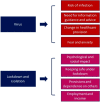COVID-19 and children with cancer: Parents' experiences, anxieties and support needs
- PMID: 33219739
- PMCID: PMC7744834
- DOI: 10.1002/pbc.28790
COVID-19 and children with cancer: Parents' experiences, anxieties and support needs
Abstract
Background: Children with cancer were designated as clinically extremely vulnerable if they were to contract SARS-CoV-2 due to immune suppression in the early phase of the COVID-19 pandemic. Our aim was to explore experiences, information and support needs, and decision making of parents with a child with cancer in response to this phase in the United Kingdom.
Methods: Parents of a child with cancer completed a survey at a time when the UK moved into a period of 'lockdown'. An online survey was developed by the research team to capture parents' experiences, information and support needs, and decision making, using closed statements and open text boxes. Descriptive quantitative analyses and qualitative thematic content analysis were undertaken.
Findings: One hundred seventy-one parents/caregivers completed the survey. Eighty-five percent were worried about the virus and they were vigilant about the virus (92%) or cancer symptoms (93.4%). For two-thirds (69.6%), hospital was no longer considered a safe place. Eight overarching themes were identified related to the virus: (a) risk of infection; (b) information, guidance and advice; (c) health care provision; (d) fears and anxieties; or related to lockdown/isolation: (e) psychological and social impact; (f) keeping safe under lockdown; (g) provisions and dependence; and (h) employment and income.
Conclusions: This is the first study, to the best of our knowledge, to report experiences of parents of a child with cancer during the SARS-CoV-2/COVID-19 pandemic. The majority of parents were worried about SARS-CoV-2 and transmitting the virus to their child. Hospital was no longer perceived to be a safe place, and parents were worried about suboptimal cancer care. Parents described fear and anxiety and the psychological, social and economic impact of isolation.
Keywords: COVID-19; cancer; child; mental health; parents; well-being; worries.
© 2020 Wiley Periodicals LLC.
Conflict of interest statement
The authors declare that there is no conflict of interest.
Figures
Comment in
-
How Has the Occupational Performance and Participation Levels of Children with Cancer Changed during the COVID-19 Pandemic?Phys Occup Ther Pediatr. 2022;42(1):15-29. doi: 10.1080/01942638.2021.1919814. Epub 2021 May 4. Phys Occup Ther Pediatr. 2022. PMID: 33947306
Similar articles
-
"No Official Help Is Available"-Experience of Parents and Children With Congenital Heart Disease During COVID-19.World J Pediatr Congenit Heart Surg. 2021 Jul;12(4):500-507. doi: 10.1177/21501351211007102. World J Pediatr Congenit Heart Surg. 2021. PMID: 34278857
-
COVID-19: experiences of lockdown and support needs in children and young adults with kidney conditions.Pediatr Nephrol. 2021 Sep;36(9):2797-2810. doi: 10.1007/s00467-021-05041-8. Epub 2021 Mar 19. Pediatr Nephrol. 2021. PMID: 33742247 Free PMC article.
-
COVID-19: Impact, experiences, and support needs of children and young adults with cystic fibrosis and parents.Pediatr Pulmonol. 2021 Sep;56(9):2845-2853. doi: 10.1002/ppul.25537. Epub 2021 Jun 29. Pediatr Pulmonol. 2021. PMID: 34138526 Free PMC article.
-
Experiences and support needs of parents/caregivers of children with cancer through the COVID-19 pandemic in the UK: a longitudinal study.Arch Dis Child. 2023 Mar;108(3):198-203. doi: 10.1136/archdischild-2022-324905. Epub 2022 Nov 30. Arch Dis Child. 2023. PMID: 36450442
-
Parents' experiences and views of caring for a child with a tracheostomy: a literature review.Int J Pediatr Otorhinolaryngol. 2013 Oct;77(10):1630-4. doi: 10.1016/j.ijporl.2013.07.020. Epub 2013 Aug 1. Int J Pediatr Otorhinolaryngol. 2013. PMID: 23953483 Review.
Cited by
-
Investigation of coronavirus anxiety and caregiving burden among the parents of children with cancer during the COVID-19 outbreak: A descriptive and cross-sectional study.Eur J Cancer Care (Engl). 2022 Jul;31(4):e13600. doi: 10.1111/ecc.13600. Epub 2022 Apr 24. Eur J Cancer Care (Engl). 2022. PMID: 35466488 Free PMC article.
-
Health-related quality of life and functionality in primary caregiver of surviving pediatric COVID-19.Front Public Health. 2023 Jun 20;11:1117854. doi: 10.3389/fpubh.2023.1117854. eCollection 2023. Front Public Health. 2023. PMID: 37408752 Free PMC article.
-
No increase in psychosocial stress of Dutch children with cancer and their caregivers during the first months of the COVID-19 pandemic.Pediatr Blood Cancer. 2021 Feb;68(2):e28827. doi: 10.1002/pbc.28827. Epub 2020 Nov 29. Pediatr Blood Cancer. 2021. PMID: 33251717 Free PMC article.
-
No Child Should Be Left Behind by COVID-19: A Report about the COVID-19 Pandemic Experience in Children and Adolescents with Acute or Chronic Disease Treated at a Pediatric Referral Hospital in Italy.Pediatr Rep. 2023 Jan 28;15(1):58-68. doi: 10.3390/pediatric15010008. Pediatr Rep. 2023. PMID: 36810338 Free PMC article.
-
The needs of cancer patients during the COVID-19 pandemic-psychosocial, ethical and spiritual aspects-systematic review.PeerJ. 2022 Jun 29;10:e13480. doi: 10.7717/peerj.13480. eCollection 2022. PeerJ. 2022. PMID: 35789657 Free PMC article.
References
-
- Children's Cancer and Leukaemia Group . https://www.cclg.org.uk/Coronavirus-advice. Accessed July 1, 2020.
MeSH terms
Grants and funding
LinkOut - more resources
Full Text Sources
Medical
Miscellaneous



